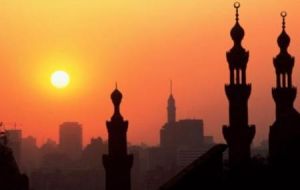MercoPress. South Atlantic News Agency
Egypt attempts to put the economy back on movement
 Banks opened, withdrawals were limited but Egyptian shares in world markets bounced back
Banks opened, withdrawals were limited but Egyptian shares in world markets bounced back The Egyptian government is struggling to finance itself as foreign investors pull out and the currency drops. It had to scale down a bond auction on Monday as state-owned banks failed to stump up enough cash.
During the two weeks long conflict daily losses for the economy were estimated in 310 million USD daily. Egypt’s GDP is estimated in 500 billion USD and the budget deficit stood at 8.2% of GDP before the protests and riots.
Meanwhile, the Egyptian pound fell to a six-year low as investors pulled money out of the country, although the fall was less than expected. Although banks have reopened their doors, the stock exchange will now remain closed until at least Sunday.
The government said that trading on the exchange would still be subject to unspecified new measures once it finally reopens.
Although the government's finances during the crisis remains problematic, they appear to have stabilised since last week. The cost of insuring against an Egyptian government default fell in international markets.
Meanwhile, Egyptian companies whose stocks are also listed in London - where trading has continued - saw their share prices bounce back. The Egyptian stock market had dropped 17% in the two days prior to its closure on 27 January.
The Egyptian pound has also proved more resilient than expected, with the market effectively reopened over the weekend as Egyptian banks were allowed to trade again. The dollar has gained just 2.3% against the Egyptian currency since the protests began on 25 January.
Although the central bank has not yet intervened to steady the currency, there are market rumours that the state-owned banks have been doing so instead, by selling their dollars to buy Egyptian pounds.
It comes after the banks were required to reopen their doors on Sunday, resulting in queues of customers seeking to withdraw cash for the first time in over a week.
In a bid to pre-empt any run on the banks by big depositors, individual withdrawals have been limited to 50,000 Egyptian pounds (8,400 USD), and up to 10,000 in foreign currency.
Yet despite this limit on their cash outflows, and despite selling their dollars, the banks were reportedly unwilling or unable to come up with all of the E£15bn sought by the government at a treasury bills auction on Monday.
With foreigners having pulled out of the market altogether during the crisis, the government was forced to reduce the amount it planned to borrow by at least E£1bn, according to the Reuters news agency.
Its borrowing cost in the auction was said to be about 11% - 1.5 percentage points higher than before the protests began. It comes after the government was forced to cancel its previous debt raising exercise at the height of the crisis last week.
Another industry that has suffered is tourism, one of Egypt's economic pillars. It has grown steadily over the last decade. More than 12 million tourists visited Egypt in 2009, accounting for nearly 11 billion US dollars in revenue.
But after 14 days of unrest, the Egyptian government said the country has lost more than 1 billion US dollars in tourism revenue. A further one million tourists have left during the turmoil, which has tarnished the country's image as a safe place to visit.
Meanwhile speculation has arisen as to the personal wealth of President Hosni Mubarak and his family.
The ABC television network in the United States ran a report suggesting the Mubarak family fortune is as high as 70 billion USD. The figure would make them as rich as Mexican tycoon Carlos Slim and Microsoft billionaire Bill Gates put together.
The family is believed to own properties in Manhattan, Beverley Hills, California and London's upmarket Belgravia area. The Mubaraks are also reported to have large cash deposits in banks in Britain and Switzerland, and to have invested heavily in hotels and tourist businesses on the Red Sea.




Top Comments
Disclaimer & comment rulesCommenting for this story is now closed.
If you have a Facebook account, become a fan and comment on our Facebook Page!